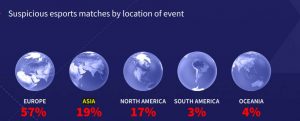The detection of a record number of suspicious games exposes the serious threat that match-fixing presents to global sport, a new report said, noting that Asia presents unique “integrity risks”.
The news comes as the amount of money bet on sports reached record heights in 2021.
The geographic spread has been more diverse in recent years and the 2021 data shows that match-fixing is a global issue.
This is a key finding of a new report prepared by Sportradar Integrity Services, a specialised technology company.
The data and sport betting provider highlighted, in its “Betting Corruption and Match-fixing in 2021” report, that 903 suspicious events spanned 10 sports in 76 countries.
This was a 2.4% increase on the previous high of 882 suspicious matches recorded in 2019.
Asia is now in second place – after Europe – in terms of the total of suspicious matches detected by Sportradar, with 161.
Football remains the most attractive – and profitable – sport for match-fixers to target due to the extensive betting coverage and market liquidity that stretches from top tier to lower league, youth and even regional and amateur competitions.
Global betting turnover has reached 1.45 trillion euros, the company estimated, with about €165 million generated from match-fixing.
In 92% of cases of suspicious betting in football, Asian betting operators are the primary target, through their popular Asian handicap results markets and total goals markets.
“The Asian marketplace is characterised by particular integrity risks,” the report found.
First, it is loosely regulated, meaning there are no formal reporting mechanisms for systematic information sharing with investigating authorities.
Second, Asian operators also generally use an agent-trading system, which often places several layers of intermediaries between the person placing a bet and the bookmaker.
 “This offers a level of anonymity to bettors,” the report said. “These two features of the Asian market make it a very attractive place for match-fixers to place their bets.”
“This offers a level of anonymity to bettors,” the report said. “These two features of the Asian market make it a very attractive place for match-fixers to place their bets.”
Together, these factors combine to reduce the detection risk for corrupt actors, which is why the vast majority of suspicious soccer betting flows through these Asian betting operators.
Asia overtook North America for the amount of suspicious e-sports matches in 2021.
Europe, due to the high number of competitions available at a large number of bookmakers, accounts for 57% of all suspicious activity across all games in e-sports.
“There is no easy short-term solution to the match-fixing issue, and we’re likely to see similar numbers of suspicious matches in 2022, if not more,” Andreas Krannich, managing director of Sportradar Integrity Services, said.
“As the market has developed, so the threat of match fixing has evolved. Now, would-be corruptors take an increasingly direct approach to match-fixing and betting corruption, with athletes messaged directly via social-media platforms.”
- George Russell
READ MORE:
Games Fever Boosts China’s Domestic Sports Brands
Games Will Make China a Winter Sports Power, Says IOC Boss
Chinese Gaming Curbs Leave E-Sports Stars Fearing For Their Futures
























